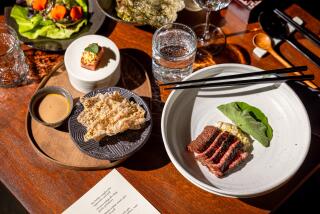An American Dream Come True at Fat’s
- Share via
SACRAMENTO — If Frank Fat had kept his real name--Dong Sai-Fat--he might not have become a living historical landmark. “Dong’s” as a restaurant name just would not have had the ring--the delicious absurdity--of “Fat’s.”
Same for his phony illegal immigrant name, Wong. Sounds more like a grocery.
But it was part of the man’s innate genius that as a struggling young immigrant from Canton, China, he named himself Frank Fat. Recalls his son, Wing Fat: “ ‘Frank Fat’ just fit.”
Frank Fat’s restaurant and California’s Capitol have been a perfect fit since he opened the political hangout 58 years ago in a rundown former speak-easy two blocks from the Capitol. “Drunk or sober, [it’s] about as far as you want to get from the Capitol afoot,” former Assemblyman and now lobbyist John Quimby once observed.
Frank Fat died last Saturday of kidney failure. He was 93. His institution and legacy, however, survive.
It’s obvious but bears repeating: Frank Fat and his exemplary family are the epitome of the American Dream. They symbolize all that’s good about immigration. They’re proof of what courage, talent and hard work can bring.
Frank sailed to San Francisco in 1919, a 16-year-old who spoke no English, using a false ID purchased by his prominent grandfather for $1,000. He picked fruit, washed dishes, swept up, waited tables--in Sacramento, Detroit, Chicago--endured discrimination and for awhile slept nights on the stone stairs to a restaurant’s basement. “It was good enough for me,” he said years later.
He returned briefly to China for an arranged marriage, which lasted happily 72 years until his death. Frank and Mary, 90, had six children, all college educated. The family got rich but never flaunted it. Says the firstborn, Wing Fat, 70: “His worth was his children.”
His worth was also his political friends.
*
What long has fascinated me is how Frank Fat’s--although by far my favorite capital restaurant--has managed to survive while other once-venerable fueling stations have gone belly up. Posey’s, Bedell’s, the El Mirador, Capital Tamale, Ellis’, the Senator Hotel, The Torch Club--all kaput.
Frank Fat once explained his success this way: “You give people good food, a nice place to eat it in and make them happy. Pretty simple, really.”
It is true that Frank’s Style New York steak--sliced and smothered with sauteed onions and oyster sauce--probably is the best beef dish anywhere. The honey-cured walnut prawns, Sang Gai Shee chow mein and homemade banana cream pie also are unbeatable. The chairs and booths are comfortable, the decor tasteful and the long central bar inviting.
But there’s much more to this restaurant’s longevity.
Fat’s has survived because of excellent service, a willingness to adapt and courage to reinvest--lessons that many of its political patrons have yet to learn.
This is a hands-on family operation. When Frank retired in 1971, Wing took over as manager and smiling host. In 1990, Wing’s son Weyland, 42, became manager and co-host. As diets have changed, the menu has been upgraded with lighter items.
But the crucial move came in 1984 when the family closed down the restaurant for nearly a year, gutted the building and remodeled at a cost of $1.2 million. The floor plan stayed the same, but the joint got spruced up and redecorated in an appeal to nonpolitical locals. It worked.
Now pols and townies rub elbows at the bar and the place often is packed. The Fats always have had a vision for the future.
*
A great deal of Frank Fat’s charm, of course, is the political folklore.
Today’s equivalent of the Assembly Ways and Means Committee meets on Wednesdays because 26 years ago the meeting day was changed from Tuesdays to accommodate a weekly all-night poker game at Fat’s. One player was the committee chairman, Willie Brown.
In those days, lobbyists freely wined and dined legislators. The kingpin lobbyist was the late “Judge” James D. Garabaldi, who represented liquor interests and the CHP. He enjoyed buying a round and announcing, “This drink’s on the Highway Patrol.” The restaurant’s most honored booth is named for Garabaldi.
There was the famous “napkin deal” in 1987. Sen. Bill Lockyer--then a committee chairman, now the Senate leader--scribbled a five-year peace pact between warring attorney and insurance factions on a linen napkin.
“Everybody was handing me yellow pads,” he recalls. “I thought it would be more theatrical to write on a napkin. I wanted to create more Capitol lore.”
Fat’s links political generations and provides continuity for a Capitol that sorely needs it.
Frank Fat is dead. Long live Frank Fat’s.
More to Read
Sign up for Essential California
The most important California stories and recommendations in your inbox every morning.
You may occasionally receive promotional content from the Los Angeles Times.











